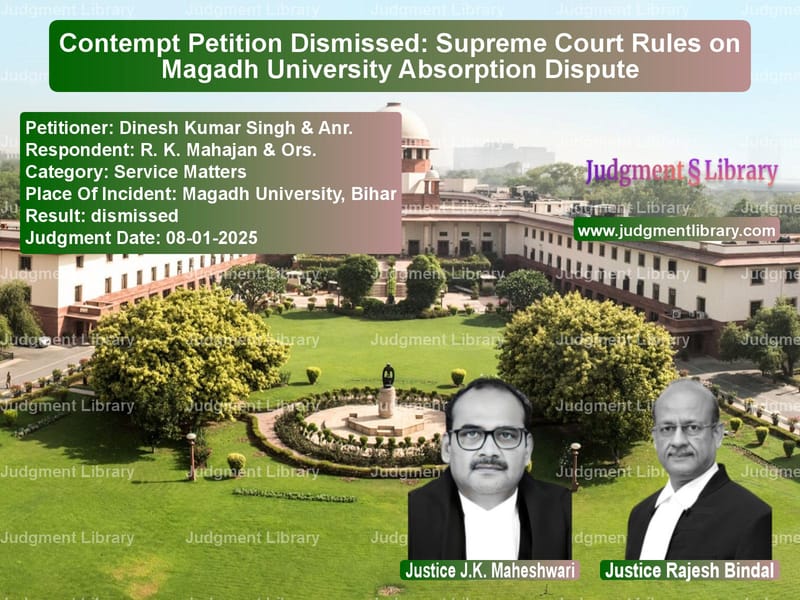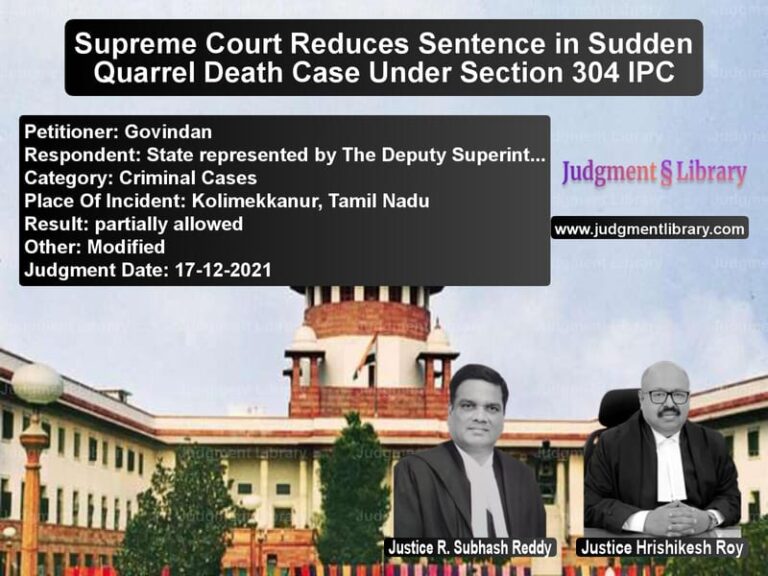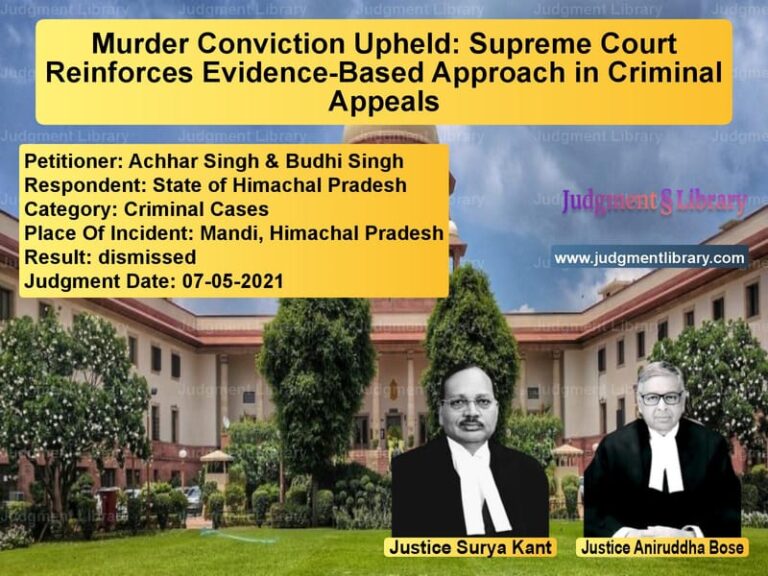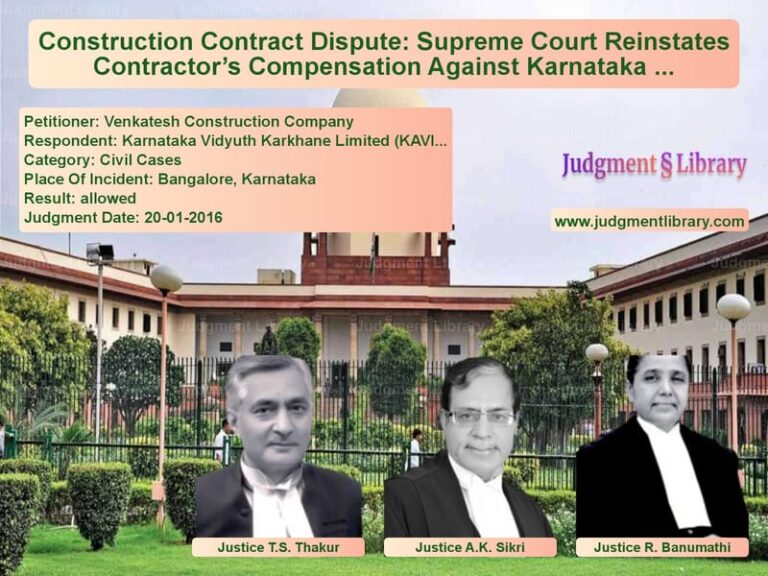Contempt Petition Dismissed: Supreme Court Rules on Magadh University Absorption Dispute
The recent Supreme Court judgment in the case of Dinesh Kumar Singh & Anr. vs. R.K. Mahajan & Ors. addressed a contempt petition filed over alleged non-compliance with an earlier court order related to the absorption of Class IV employees at Magadh University. The petitioners claimed that despite a decision by the J. Sinha Commission recommending their absorption, the university and state authorities failed to comply with the order. The Supreme Court ultimately dismissed the contempt petition, ruling that no willful or deliberate non-compliance had occurred.
Background of the Case
The petitioners were appointed as Peons at R.K. Dwarka College, a constituent unit of Magadh University. They argued that their claims for absorption were upheld by the J. Sinha Commission, a one-member commission appointed to resolve employment disputes within the university. The commission, in its orders dated 05.05.2016 and 24.06.2016, directed that vacancies be filled based on qualifications and inter-se seniority.
However, despite these recommendations, the petitioners alleged that Magadh University failed to absorb them into permanent positions, prompting them to file a contempt petition against university officials and the State of Bihar.
Key Legal Issues
- Whether Magadh University and the State of Bihar failed to comply with the J. Sinha Commission’s recommendations.
- Whether the failure to absorb the petitioners amounted to contempt of court.
- Whether the J. Sinha Commission’s recommendations constituted binding legal orders or mere guidelines.
Arguments by the Petitioners
- The J. Sinha Commission explicitly directed the absorption of eligible Class IV employees, including the petitioners.
- Despite clear vacancies, Magadh University did not take action to absorb the petitioners.
- The Supreme Court’s prior judgment in Krishna Nand Yadav & Ors. vs. Magadh University & Ors. mandated compliance with the commission’s recommendations.
- The failure to absorb the petitioners was a deliberate violation of court orders, constituting contempt.
Arguments by the Respondents
- The J. Sinha Commission’s order did not provide a direct directive for absorption but merely recommended considering eligible candidates.
- The State of Bihar stated that it had not received proper recommendations from the university regarding the absorption process.
- The government had asked the university to send revised recommendations as per the commission’s directives, which was never done.
- Since no final decision had been taken regarding the absorption of the petitioners, no case of deliberate or willful contempt could be made out.
Supreme Court’s Observations
The Supreme Court carefully reviewed the J. Sinha Commission’s orders and found that:
1. No Binding Order for Absorption
The Court observed that the J. Sinha Commission did not issue a categorical order for absorption. Instead, it only suggested that vacancies could be filled based on inter-se seniority and qualifications.
“On perusal of the above orders, it is apparent that there is no positive direction in favor of the petitioners herein for absorption.”
2. No Willful Non-Compliance
The Court held that the State of Bihar had taken steps to ensure compliance by requesting the university to send revised recommendations. Since this process remained incomplete, there was no intentional defiance of the court’s orders.
“In view of the factual scenario of the matter and the counter affidavit of the State, we find that this is not a case of willful non-compliance.”
3. Alternative Remedies Available
The Supreme Court clarified that while the petitioners may feel aggrieved by the non-absorption, they could explore other legal remedies such as filing a fresh petition or seeking redress through administrative channels.
“However, such dismissal will not debar the petitioners from availing any other remedy for redressal of their grievances, if any, in accordance with law.”
Final Verdict
Based on the above findings, the Supreme Court dismissed the contempt petition, stating that no deliberate violation of court orders had occurred. However, the Court left open the possibility for the petitioners to pursue other legal avenues.
Impact of the Judgment
This ruling clarifies that recommendations by commissions such as the J. Sinha Commission are not necessarily binding unless explicitly stated as mandatory directives. It also reinforces the principle that contempt of court applies only in cases of clear and willful disobedience of judicial orders.
The petitioners may now seek alternative legal remedies, including filing a new case challenging their non-absorption, but the university and state authorities are not immediately required to absorb them based on the dismissed contempt petition.
Petitioner Name: Dinesh Kumar Singh & Anr..Respondent Name: R. K. Mahajan & Ors..Judgment By: Justice J.K. Maheshwari, Justice Rajesh Bindal.Place Of Incident: Magadh University, Bihar.Judgment Date: 08-01-2025.
Don’t miss out on the full details! Download the complete judgment in PDF format below and gain valuable insights instantly!
Download Judgment: dinesh-kumar-singh-&-vs-r.-k.-mahajan-&-ors.-supreme-court-of-india-judgment-dated-08-01-2025.pdf
Directly Download Judgment: Directly download this Judgment
See all petitions in Employment Disputes
See all petitions in Recruitment Policies
See all petitions in Public Sector Employees
See all petitions in Judgment by J.K. Maheshwari
See all petitions in Judgment by Rajesh Bindal
See all petitions in dismissed
See all petitions in supreme court of India judgments January 2025
See all petitions in 2025 judgments
See all posts in Service Matters Category
See all allowed petitions in Service Matters Category
See all Dismissed petitions in Service Matters Category
See all partially allowed petitions in Service Matters Category







